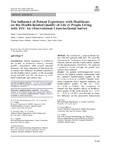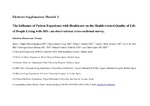Mostrar o rexistro simple do ítem
The Influence of Patient Experience with Healthcare on the Health-Related Quality of Life of People Living with HIV: An Observational Cross-Sectional Survey
| dc.contributor.author | Fuster-RuizdeApodaca, María J. | |
| dc.contributor.author | Sánchez-Vega, Nuria | |
| dc.contributor.author | Galindo, María J. | |
| dc.contributor.author | Marín-Jimenez, Ignacio | |
| dc.contributor.author | De-Toro, Javier | |
| dc.contributor.author | Orozco-Beltrán, Domingo | |
| dc.contributor.author | Cotarelo, Manuel | |
| dc.contributor.author | López, Juan Carlos | |
| dc.date.accessioned | 2020-06-18T10:38:21Z | |
| dc.date.available | 2020-06-18T10:38:21Z | |
| dc.date.issued | 2019-07-09 | |
| dc.identifier.citation | Fuster-RuizdeApodaca MJ, Sánchez-Vega N, Galindo MJ, et al. The Influence of Patient Experience with Healthcare on the Health-Related Quality of Life of People Living with HIV: An Observational Cross-Sectional Survey. Infect Dis Ther. 2019; 8:369–382 | es_ES |
| dc.identifier.issn | 2193-6382 | |
| dc.identifier.issn | 2193-8229 | |
| dc.identifier.uri | http://hdl.handle.net/2183/25740 | |
| dc.description.abstract | [Abstract] Introduction Patient experience is central to the quality of healthcare delivery, showing positive associations with several outcome measures. The main objectives of this study are to analyze the influence of patient experience on the health-related quality of life in people living with HIV and the role played by treatment complexity and clinical care. Methods We conducted a cross-sectional survey with 467 patients with HIV. We used the Instrument for Evaluation of the Experience of Chronic Patients and the Health-related Quality of Life Questionnaire (EQ-5D-5L). We analyzed a predictive model through the partial least squares (PLS) method. Results The patient self-management scores showed the highest positive relationship with the patient’s health-related quality of life (β = 0.24, β = 0.32, p < 0.0001). Patients’ treatment complexity had a negative influence on health-related quality of life (β = − 0.21, β = − 0.28, p < 0.0001). The complexity of clinical care had negative effects on health-related quality of life, both directly (β = − 0.37, β = − 0.19, p < 0.0001) and through its negative influence on the productive interactions with healthcare professionals (β = − 0.21, p < 0.0001) and patient self-management factors (β = − 0.21, p < 0.0001). The effects of patient experience dimensions on their health-related quality of life were higher in people living with HIV > 50 years old (p < 0.05). Conclusions Patient experience mainly influenced the health-related quality of life of older people living with HIV. The treatment and clinical care complexity played an important role in degrading the patients' experience and their quality of life. More integrated care would benefit the health-related quality of life of people living with HIV. | es_ES |
| dc.language.iso | eng | es_ES |
| dc.publisher | Springer Nature | es_ES |
| dc.relation.uri | https://doi.org/10.1007/s40121-019-0252-3 | es_ES |
| dc.rights | Atribución-NoComercial 4.0 España | es_ES |
| dc.rights.uri | http://creativecommons.org/licenses/by-nc/4.0/es/ | * |
| dc.subject | Health-related quality of life | es_ES |
| dc.subject | HIV | es_ES |
| dc.subject | Patient experience | es_ES |
| dc.title | The Influence of Patient Experience with Healthcare on the Health-Related Quality of Life of People Living with HIV: An Observational Cross-Sectional Survey | es_ES |
| dc.type | info:eu-repo/semantics/article | es_ES |
| dc.rights.access | info:eu-repo/semantics/openAccess | es_ES |
| UDC.journalTitle | Infectious Diseases and Therapy | es_ES |
| UDC.volume | 8 | es_ES |
| UDC.startPage | 369 | es_ES |
| UDC.endPage | 382 | es_ES |
Ficheiros no ítem
Este ítem aparece na(s) seguinte(s) colección(s)
-
INIBIC-TCMR - Artigos [102]







